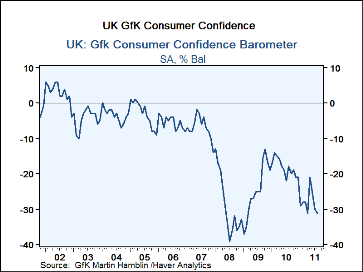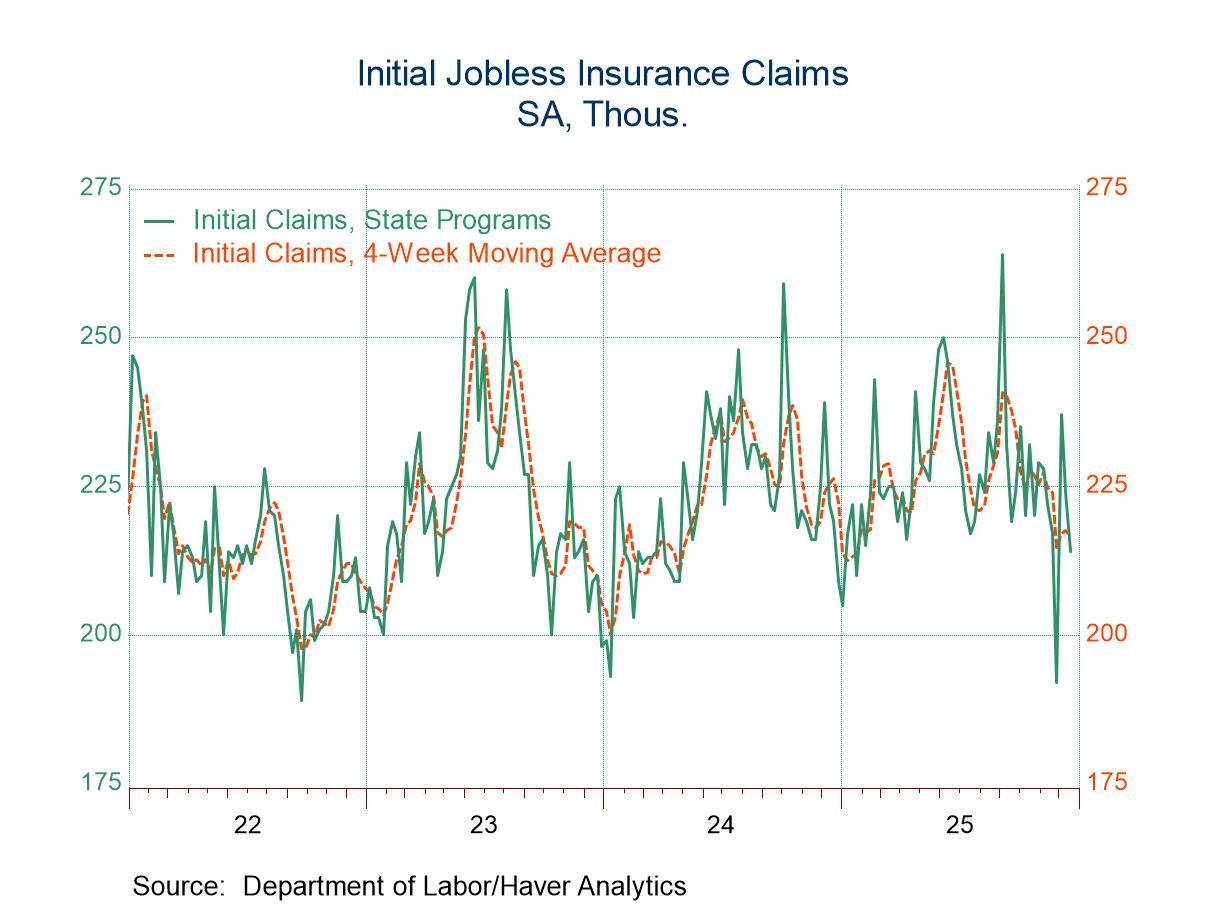 Global| Aug 31 2011
Global| Aug 31 2011UK Consumer Confidence Sinks Back - While Some People Never Learn
Summary
UK consumers are suffering a relapse. After seeing confidence jump in May, June, July and August have brought on a relapse. Is it the knock-on effects of the European debt crisis or an overdose of the policies of the Conservative [...]
 UK consumers are suffering a relapse. After seeing confidence jump in May,
June, July and August have brought on a relapse. Is it the knock-on effects of the
European debt crisis or an overdose of the policies of the Conservative government?
Political opinions notwithstanding, time will sort it all out for us.
UK consumers are suffering a relapse. After seeing confidence jump in May,
June, July and August have brought on a relapse. Is it the knock-on effects of the
European debt crisis or an overdose of the policies of the Conservative government?
Political opinions notwithstanding, time will sort it all out for us.
In August consumer confidence lost only one point. Yet this keeps it in a downtrend in an economy with few good trends in gear and having reported some very weak results in retailing- not a good thing for a ‘nation of shop-keepers.’
The overall GFK index is in the bottom 16% of its queue of values over the last ten years, implying that it is weaker than this only 16% of the time; better than this some 86% of the time. Those are not favorable metrics.
The current household finical situation is ‘worse than this’ only18% of the time. As a time to make major purchases, things are worse than this only 14% of the time.
But this is an improvement over the past 12-months, at least for the household’s perceived financial situation which had been worse than that only 1.6% of the time.
But over the next 12-months, the metric that really counts, conditions are expected to continue to be grim. Consumers expect that the financial situation will have been worse only 13% of the time over the coming 12-months. They expect that the general economic situation will have been worse only 21% of the time. They expect that the environment to make major purchases will prove to have been worse only 23% of the time. That, latter metric, is an improvement compared to where things are now for major purchases.
Stratified into upper and lower income groups, there is not much difference in how people assess things. For upper incomes things are worse only 23% of the time; for lower incomes things are worse only19% of the time. Not much difference there. Certainly there is not enough for any political party to exploit a class divide, and we all know that that is the reality that matters most when times are bad and you have a parliamentary form of government.
On balance the UK economy is still reeling. After an attempt to feel better and to summon that famed British ‘stiff upper lip’, quavering has been detected. The consumer has had a relapse. While the reading is far from the floor of the last cycle, the faltering is significant and the momentum is decidedly negative. The plan to shrink itself into better economic times is not working. It is working like a person determined to shove a size 10 foot into a size 7.5 shoe. Someone may have sold it to you on the cheap and it may have looked good in the store but the real test is can you make it work in real life? You can be cynical about Keynesianism if you want but ‘Bizzaro Keynesianism’ or ‘anti-Keynesianism’ simply does not cut it. You cannot put a patient on a fat-reducing plan straight out of intensive care or try to purge an economy off its fat before it has had time to gather itself after a severe recession. That goes double if a financial crisis has accompanied it.
What we are seeing is the abject failure of German economic leadership. The Germans, in this cycle are the men with the money... And, we all know the golden rule: He who has the gold makes the rules. But while this sort of medicine maybe the right ‘tu-tonic’ for Germany, yet it needs a little bit of sugar to help it go down in other places, as even Mary Poppins knows. This bitter pill of contraction on top of enfeebled growth and a weakened and wary financial sector has been a disaster in the UK where inflation has continued to fly over the top of its target even as money supply has been shrinking faster than Alice in Wonderland after taking her shrink-pill.
Even with the effects of these policies well-demonstrated in the EMU and on the UK economies the Tea Party types in the US want more or should I say less? I’m sure Lewis Carroll would enjoy the irony of it all from the language of ‘less’ to the odd reality of it all. Tea Partyers want to join this Mad Hatter inspired cut-fest. “More? How can I have more when I haven’t had any? Or, in fact, since I have had even less from the start,” Alice might ask if she were managing policy. And while she is not is appears that The Mad Hatter is. Who says literature is dead in America? Its best caricatures are alive and well and making appearances in the American Political Scene. One politico from Texas (down the rabbit hole if any state ever was...) even wants off with Bernanke’s head! I know that is playing fast and loose with the plot line but it is still quite entertaining.
| GFK Consumer Survey | |||||||
|---|---|---|---|---|---|---|---|
| Aug 11 |
Jul 11 |
Jun 11 |
May 11 |
% of 2Yr Range |
% of 10Yr Range |
% of 10Yr Queue |
|
| Consumer Confidence | -31 | -30 | -25 | -21 | 0.0% | 21.6% | 16.4% |
| Current | |||||||
| Household Fin Sit | 15 | 14 | 16 | 18 | 20.0% | 9.1% | 18.0% |
| Major Purchases | -31 | -31 | -27 | -26 | 0.0% | 22.6% | 14.8% |
| Last 12 Months | |||||||
| Household Fin Sit | -24 | -25 | -20 | -18 | 7.7% | 3.4% | 1.6% |
| General Econ Sit | -57 | -57 | -50 | -44 | 53.3% | 39.1% | 36.1% |
| CPI | 101 | 108 | 103 | 101 | 86.0% | 82.7% | 82.0% |
| Savings | -10 | -7 | -9 | -1 | 35.7% | 22.4% | 19.7% |
| Next 12-Months | |||||||
| Household Fin Sit | -11 | -12 | -8 | -3 | 15.0% | 22.6% | 13.1% |
| General Econ Sit | -31 | -27 | -18 | -15 | 0.0% | 37.5% | 21.3% |
| Unemployment | 45 | 44 | 41 | 43 | 53.8% | 36.7% | 57.4% |
| Major Purchases | -33 | -33 | -31 | -29 | 30.0% | 29.2% | 23.0% |
| Savings | 4 | 1 | 3 | 8 | 60.0% | 30.4% | 42.6% |
| CPI | 74 | 77 | 74 | 73 | 61.0% | 66.7% | 67.2% |
| By Income | |||||||
| Lower | -37 | -39 | -32 | -32 | 9.5% | 20.5% | 19.7% |
| Upper | -22 | -19 | -18 | -13 | 0.0% | 27.0% | 23.0% |
Robert Brusca
AuthorMore in Author Profile »Robert A. Brusca is Chief Economist of Fact and Opinion Economics, a consulting firm he founded in Manhattan. He has been an economist on Wall Street for over 25 years. He has visited central banking and large institutional clients in over 30 countries in his career as an economist. Mr. Brusca was a Divisional Research Chief at the Federal Reserve Bank of NY (Chief of the International Financial markets Division), a Fed Watcher at Irving Trust and Chief Economist at Nikko Securities International. He is widely quoted and appears in various media. Mr. Brusca holds an MA and Ph.D. in economics from Michigan State University and a BA in Economics from the University of Michigan. His research pursues his strong interests in non aligned policy economics as well as international economics. FAO Economics’ research targets investors to assist them in making better investment decisions in stocks, bonds and in a variety of international assets. The company does not manage money and has no conflicts in giving economic advice.






